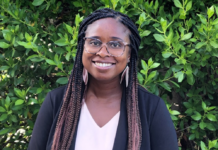One week remains on the Monroe County school calendar for 2018-19. Kids are dreaming of long lazy days, but there’s still a last hurdle to leap.
In May, Florida Standard Assessment (FSA) testing begins.
Katie Holtkamp, a middle-school teacher at Horace O’Bryant School (HOB), said this year is especially challenging, as testing started earlier and school is ending earlier than normal. Despite the compressed schedule, she feels that her students are prepared and are taking things in stride.
“It’s a lot of going with the moment, but we work to accommodate every kid,” said Holtkamp.
Parents, educators and students are all seeking ways to reduce the pressure. Holtkamp makes a point of getting her students outside for fresh-air breaks. At home, parents are rolling back bedtimes and stocking up on healthy snacks. While parents and teachers emphasize surviving the next three weeks in the healthiest ways possible, results still command major attention. Statewide, communities and generations of students are being affected by the assessments.
The state uses FSA results to evaluate teachers and schools and to track student progress. The intention is that districts may use these results to course-correct where needed. At their best, assessments point to universal areas of struggle. Unfortunately, limited autonomy over curriculum means this may not be the actual result. In recent years, teachers have adjusted to curriculums, requiring them to spend as much as 30% of the school year on test preparation.
School board member Sue Woltanski recalls that when her daughter was in kindergarten, students were told to circle the answers on their tests. A few years later, when her son entered kindergarten, he was required to fill in a bubble. From an early age, her son was being trained how to take tests properly.
“The focus on the tests has taken over,” she said.
The FSAs are scored on a scale of 1 to 5, where 1 is deemed “inadequate” with the student “highly likely to need substantial support,” and 5 is considered “mastery,” indicating students are “highly likely to excel.” According to the Florida Department of Education (FDOE), on average, across all school districts in Florida, just 54% of students achieved a score of 3 or above. Level 3 is considered “passing” and indicates a “need for additional support for the next grade.”
This is where the issues become cumulative. When students hit the next grade, their teachers will be working to share the lessons for the next grade level while putting in extra effort to help the 46% of students who, statistically, need to be brought up to speed.
For students with disabilities, the achievement level drops to 21%. For students categorized as English language learners, that number drops to 17%. There are numerous studies on the correlations between test scores and social mobility, but nobody understands the connections better than an educator. Woltanski said test scores “reflect what’s happening outside of the school more than what’s happening in the school.”
Despite efforts on the part of teachers, resources to help students with unique challenges are in short supply. For example, one benchmark stipulates that schools must test 95% of their students. This sets up an inequitable metric, as schools can’t realistically maintain complete control over attendance. Obstacles, from family disruptions to lack of transportation, and even homelessness, may prevent regular attendance.
The repercussions from these challenges affect broad communities. Schools are evaluated by the state and receive a grade.
“The carrot is not as enticing as the stick is frightening,” said Woltanski, discussing the high stakes of testing. The “carrot” comes in the form of high grades for schools and subsequent funding bumps. Of the 11 components used to determine school grades, four are tied directly to standardized testing. Schools achieving an “A” grade are eligible for extra funding of up to $100 per full-time student. Though spending decisions are at the discretion of the district, typically these extra funds are paid to teachers as bonuses.
The “stick,” on the other hand, yields all sorts of fallout scenarios. The promise of potential teacher bonuses places additional pressure on teachers to push students to succeed. Lower school grades affect real estate prices in communities, which in turn affect a town’s entire economy. Schools that consistently fail to meet basic levels are threatened with closure. Woltanski said that in those situations, privatized educational options are left to fill the void left by a public school closure.
While seventh graders may not be thinking about how their scores affect their teacher’s salary or the financial health of their community, they are most certainly feeling the pressure.
Fortunately, school grades do not speak to the caliber of teachers or the caliber of students. Holtkamp said of her students, “although testing is important, it’s more important that they succeed daily.”
Still, the bottom line is, parents, tuck your kids in early. Teachers, pat yourselves on the back. Kids, take a deep breath. Summer is coming.
Florida Standard Assessments (FSAs) are state tests used to assess students and schools. FSAs include testing in English language arts for grades 3-11, mathematics for grades 3-8, and end-of-course (EOC) assessments in algebra 1, geometry, algebra 2, biology, U.S. history, and civics. Of these tests, EOCs are the only scores that are factored into students’ course grades. The assessments are all summative, which means they serve as a survey of the academic year, capturing what students have learned from the past year’s curriculum. In 2018, Monroe County beat the state average by a small margin but, like most districts, fell within a finite range of scores.
More information is at fldoe.org/accountability/accountability-reporting/fl-school-recognition-program/


























